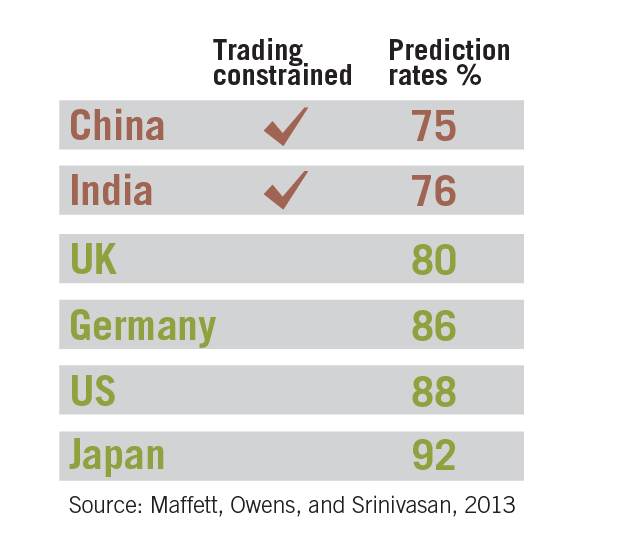
Are You Responsible for Your ‘Passive’ Investments?
To what extent are we accountable for what goes into index funds?
Are You Responsible for Your ‘Passive’ Investments?When a hedge-fund manager publicly criticizes a company and questions its prospects, he is often touting his short position—if the stock drops, he makes money.
This is often unpopular, especially with investors, executives, and employees who want the stock to rise. But research suggests that short-sellers are helping investors in an important respect, by improving their ability to predict a corporate default.
Short-sellers anticipate share-price declines, sometimes on presumed knowledge of a company’s fraudulent or seriously misleading accounting information. Prior research has suggested that short-sellers can bring valuable information to the market. Bans on short selling can delay price adjustments that reflect negative publicly available information and reduce or even eliminate investors’ incentives to dig into and analyze public information.
Assistant Professor Mark G. Maffett, with Edward L. Owens of the University of Rochester and Anand Srinivasan of the National University of Singapore, in their study of pessimistic trading, which also includes trading in exchange-traded put options and certain credit default swaps, identify the additional potential benefit of pessimistic trading, an improvement in investors’ ability to accurately assess a company’s likelihood of default.
Investors trying to spot corporate problems use public information and company fundamentals to assess a company’s health. To predict the likelihood that a company will default, investors use models that can include a stock’s returns, volatility, market capitalization, profitability, and leverage ratio.
Whether investors are successful at this may depend on where a company is located, according to the researchers, who compare default predictions made in countries that have pessimistic trading and those that don’t. While short selling is active in countries such as the United States, many countries have cracked down on short-sellers, upholding bans on the practice and related trading techniques for the better part of the past decade (see chart). And in some places such as Hong Kong, even if short selling isn’t outright banned, it is rarely common practice. If shares aren’t available to be borrowed, it’s impossible to sell a stock short. If a stock is thinly traded, or if a high proportion of shares are owned by founders, family, or only a few institutions, that, too, can inhibit short selling.
Investors in markets with limited pessimistic trading are hampered by the lack of negative information, the research suggests. In jurisdictions with pessimistic trading, investors do a better job of predicting the likelihood of default. Elsewhere, the reverse is true.

Is this because short-sellers are causing defaults? During periods of high economic uncertainty, the research finds, short selling could exacerbate signals that inaccurately classify some companies as potential defaults, putting stress on companies that might be fundamentally sound. But Maffett says that while this does muddy prediction models, there’s no empirical evidence showing that short selling causes defaults.
Because investors in markets with limited pessimistic trading are at a disadvantage when it comes to predicting defaults, they should beef up their earnings-forecasting models with fundamental analysis that focuses on accounting variables such as return on assets and leverage ratios, the researchers suggest.
They emphasize that it’s particularly critical in these areas to do fundamental analysis—the due diligence that an investor does to understand the performance of a company. In countries where pessimistic trading is allowed, including this accounting information increases overall corporate default prediction accuracy by 8%. And in markets where pessimistic trading is constrained, including the accounting information increases overall corporate default prediction accuracy by 18%. The researchers also conclude that accounting information has more influence when it’s presented transparently, with equal access for all market participants.
Mark G. Maffett, Edward L. Owens, and Anand Srinivasan, “Default Prediction around the World: The Effect of Constraints on Pessimistic Trading,” Working paper, July 2013.

To what extent are we accountable for what goes into index funds?
Are You Responsible for Your ‘Passive’ Investments?
Investors and academics debated exit versus voice.
To Drive Change, Should Investors Divest or Engage?
How can we contend with all we don’t know about the interplay of climate science and economics?
Confronting Uncertainty in Climate PolicyYour Privacy
We want to demonstrate our commitment to your privacy. Please review Chicago Booth's privacy notice, which provides information explaining how and why we collect particular information when you visit our website.